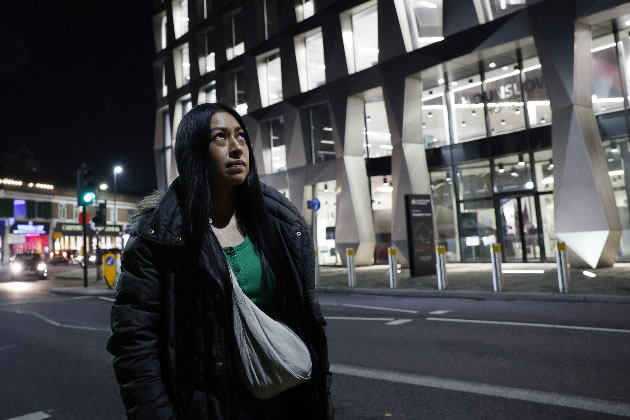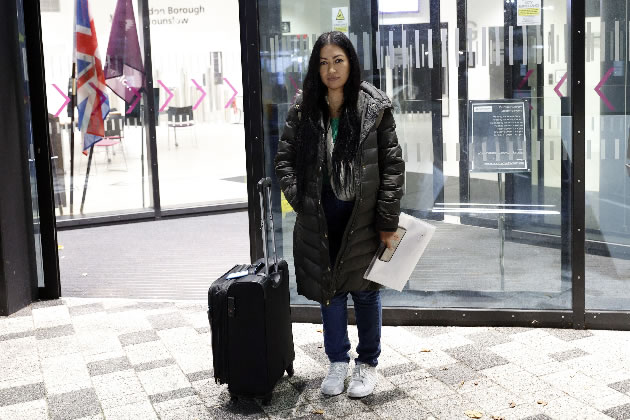Getting Asylum Doesn't End Refugees' Problems
The next often impossible challenge they face is getting housing

Margarita Fruentes had little time to find somewhere to live after being evicted from a Home Office hotel. Picture: Facundo
November 24, 2023
There is a quiet chaos that inhabits the lobby of Hounslow House late on a Friday afternoon. Officers and support workers run back and forth while people and their possessions lie strewn across the cavernous waiting area.
The group is made up of those there for routine appointments, homeless people looking to speak to the housing department and recently evicted refugees with nowhere else to go. Having been granted asylum by the Home Office those fleeing their countries from political, religious and military persecution appear to have been left to their own devices.
The timeframe of the leave they are given to stay in the UK and when they are evicted from a hotel or in some cases a barge, military base or asylum centre, seems to vary. The Home Office says they are given at least 28 days’ notice while refugees and campaigners say this is often much lower.
Margarita Fuentes was given less than a month to find a home, get a job, apply for Universal Credit, fill out relevant paperwork and begin rebuilding her life before she was kicked out of her Home Office supplied accommodation. That’s how she found herself sitting in the Hounslow Council offices on a cold Friday evening (17 November), the same day as a letter informing her of her eviction time is dated.
She is a political refugee from El Salvador in Central America, forced to flee a high-profile job as a photographer due to threats by the country’s increasingly authoritarian regime, leaving her son behind. In her old role, it was her responsibility to photograph the country’s presidents – three in total – before the rise of Nayib Bukele who is currently leading a crackdown which includes silencing critics, arbitrary arrests and state violence.
Margarita does not speak English, but through a translator, she explained how the UK presented the best option for her survival, far away from the threats she received after speaking up against the government. She arrived in Britain with very little and described how she never thought she would ever have to leave her home.
Making an official asylum application, Margarita would find herself in stasis for a year and a half as the Home Office assessed her case. She says she was grateful that she was given asylum, and that the government housed and fed her during the long and uncertain 18 months she spent waiting for her status as a refugee to be confirmed.

Margarita Fruentes outside Hounslow House. Picture: Facundo
However, she expressed repeatedly to the Local Democracy Reporting Service (LDRS) how long it took, and how crippling a year and a half without being able to work, without being able to plan ahead, was for her and her fellow asylum seekers. Margarita informed LDRS that she was given £8 a week as an allowance by the Home Office, an amount even with every penny saved for a year and a half that would still be unlikely to cover even the most basic housing deposit.
With the Home Office confirming her refugee status is set to expire five years from now, the process would rapidly accelerate for Margarita. Now she had to find a job, a home, a community, a GP, all without having a strong grasp of English.
The result was, perhaps, fairly predictable. Margarita came to the local authority for help, as many in her situation do, looking for emergency assistance to keep her off the streets. She was not the only one.
After hours of sitting in the council offices, no offer for a bed came and Margarita and other recent refugees were once again turfed out, their second eviction of the day. One of the people flowing out onto the street was Neetu Kaur and her family who stood huddled around several suitcases at a nearby bus stop.
The 20-year-old is the only one in her family who can speak English. She explains that they are waiting for the council’s emergency phone line to open at 7:30pm, a full two hours after the council shuts its doors to the public.
Neetu said: “[The council] said there was limited accommodation and that we would have to wait until Monday. They told us if we have nowhere to stay until Monday we need to contact the emergency services.”
This is the same uneasy wait Margarita is having to make down the high street in a nearby café. As a family, Neetu, her brother and elderly parents are a bigger priority for housing than Margarita who was informed that she would not be considered at the front of the queue for emergency housing.
While it is unclear what happened to Neetu and her family, Margarita is now enjoying the hospitality of a local church, which is giving her a place to stay until she can find more permanent shelter. As an unemployed refugee on Universal Credit with limited language skills, she really struggled. LDRS has since been informed that Margarita was helped by Hounslow Council to find a room and has now moved out of her place to the church.
Lara Parizotto, an Independent councillor for Hounslow and co-director of the Migrant Democracy Project, says that not enough is being done to support refugees, especially in the crucial period when they move from asylum seeker to gaining the right to stay in the UK.
She said: “When people finally get their refugee status it should be a day of celebration. Instead, the Home Office’s eviction policy means people face immediate homelessness and destitution.”
Cllr Parizotto says she has seen people evicted after seven days, well before the 28 days the Home Office has said people are supposed to be given. Even if they are given a longer grace period the councillor says many still feel it is not enough.
“A lot of organisations have been saying that 28 days are not enough and that it should be 56 days.” If a person were to apply for Universal Credit the same day they get their refugee status, they would still be waiting to receive their first payment by the time they are evicted, even if they ask for a prepayment.
This was the situation Margarita found herself in having a four-day period between when she left the Home Office hotel and when she received her first payment. The result for her and for others like her is they are left by the Home Office without money or a place to stay.
Indeed, Cllr Parizotto says that this is not an issue reserved for Hounslow Council but for councils across the UK. In a recent report by the Guardian, Liverpool is currently experiencing a huge spike in homeless refugees.
The Merseyside Refugee Support Network told the paper that two or three refugees a year would ask the charity for help because they were homeless; since August, there have been about 150. Cllr Parizotto says this is only going to get worse as time goes on and the responsibility for housing refugees is unceremoniously thrust onto charities and councils.
A Home Office spokesperson said: “Once someone is informed that their asylum claim has been granted, they get at least 28 days’ notice to move on from their asylum accommodation. Support is offered to newly recognised refugees by Migrant Help and their partners, which includes advice on how to access the Universal Credit, the labour market and where to get assistance with housing. We work with local authorities to help communities manage the impact of asylum decisions.”
However, Councillor Tom Bruce, Hounslow Council’s Cabinet Member for Regeneration and Development, says in a statement that the Home Office’s top-down approach is making local authorities and refugees’ lives harder. He said: “We are facing an unprecedented housing crisis and amidst that the lack of permanent accommodation for refugees and asylum seekers is critical. Local authorities are having to work with the failings of a broken system and no additional funding to support an already vulnerable group of people.
“To highlight the extent of this, for the month of October 2023, we received 49 applications for housing assistance from those who have recently been granted refugee status which represents 20% of the total demand for housing assistance in the month.
“The Home Office need to work with local authorities and the voluntary sector to ensure people can access adequate and timely support. The current top down approach is not sustainable and is leaving an already traumatised group of people having to face displacement once again. We have a proud history of supporting refugees and asylum seekers, and we always try to ensure they are treated with dignity and respect, and will continue to support them as best as we can.”
Rory Bennett - Local Democracy Reporter